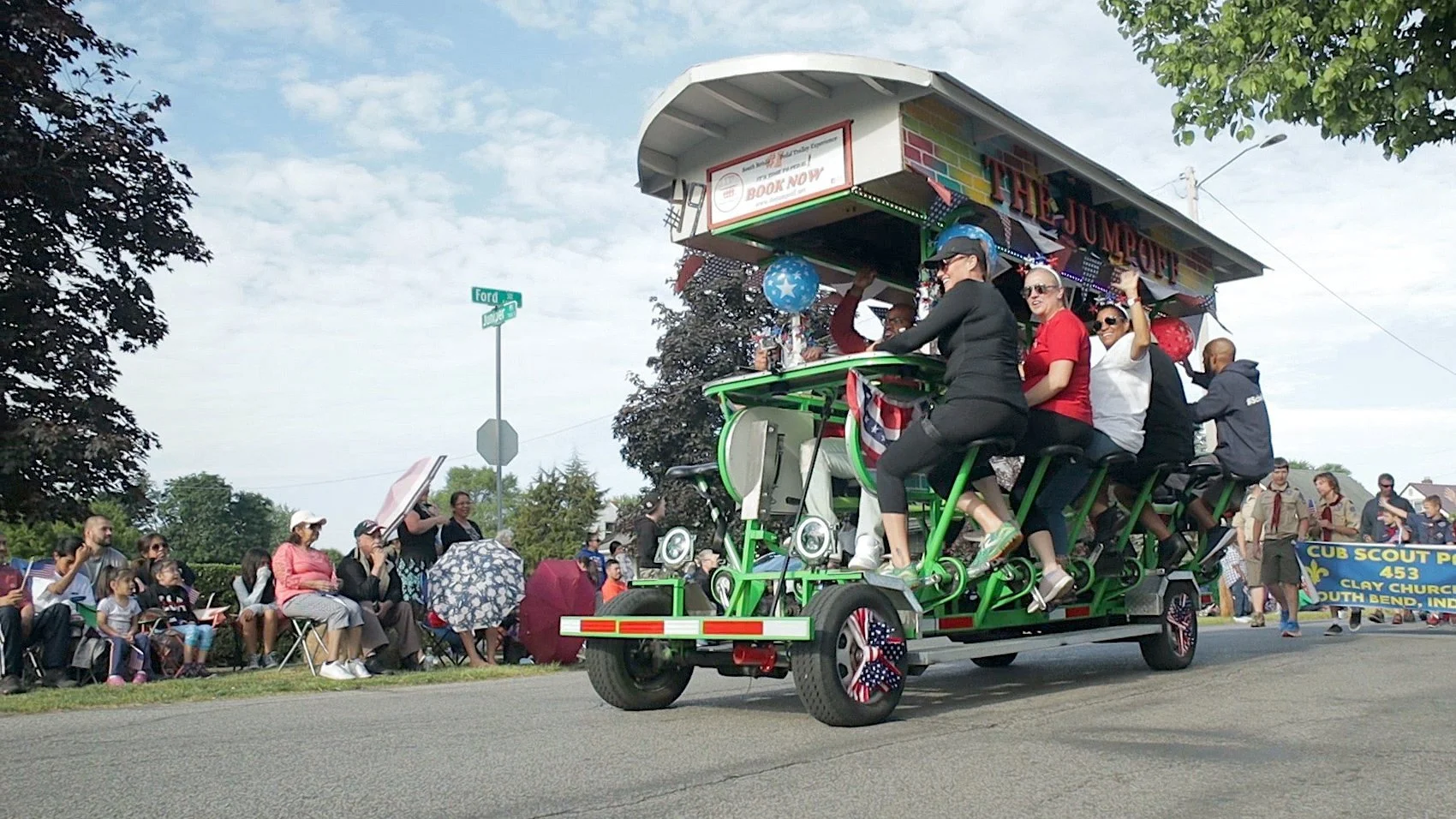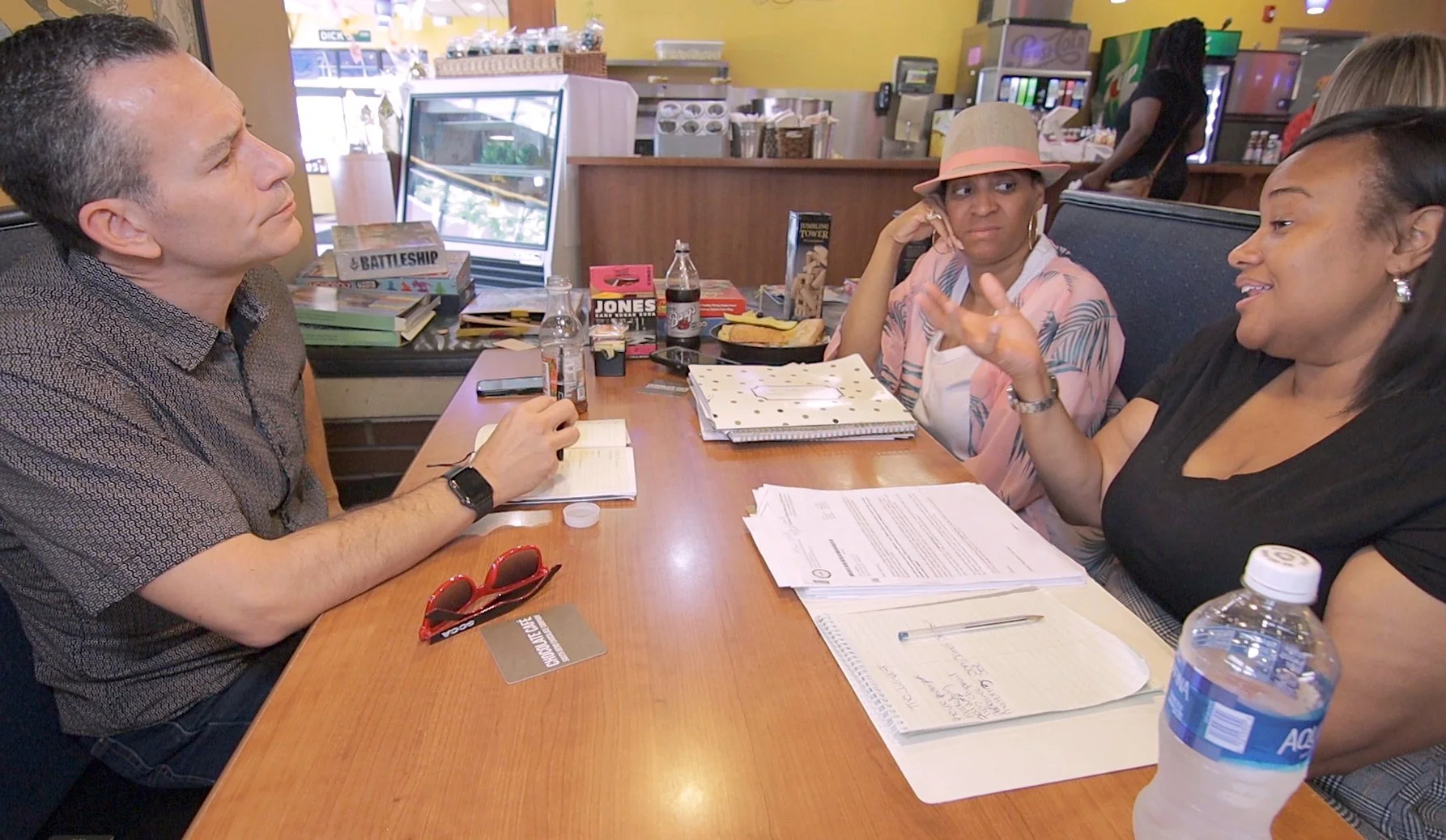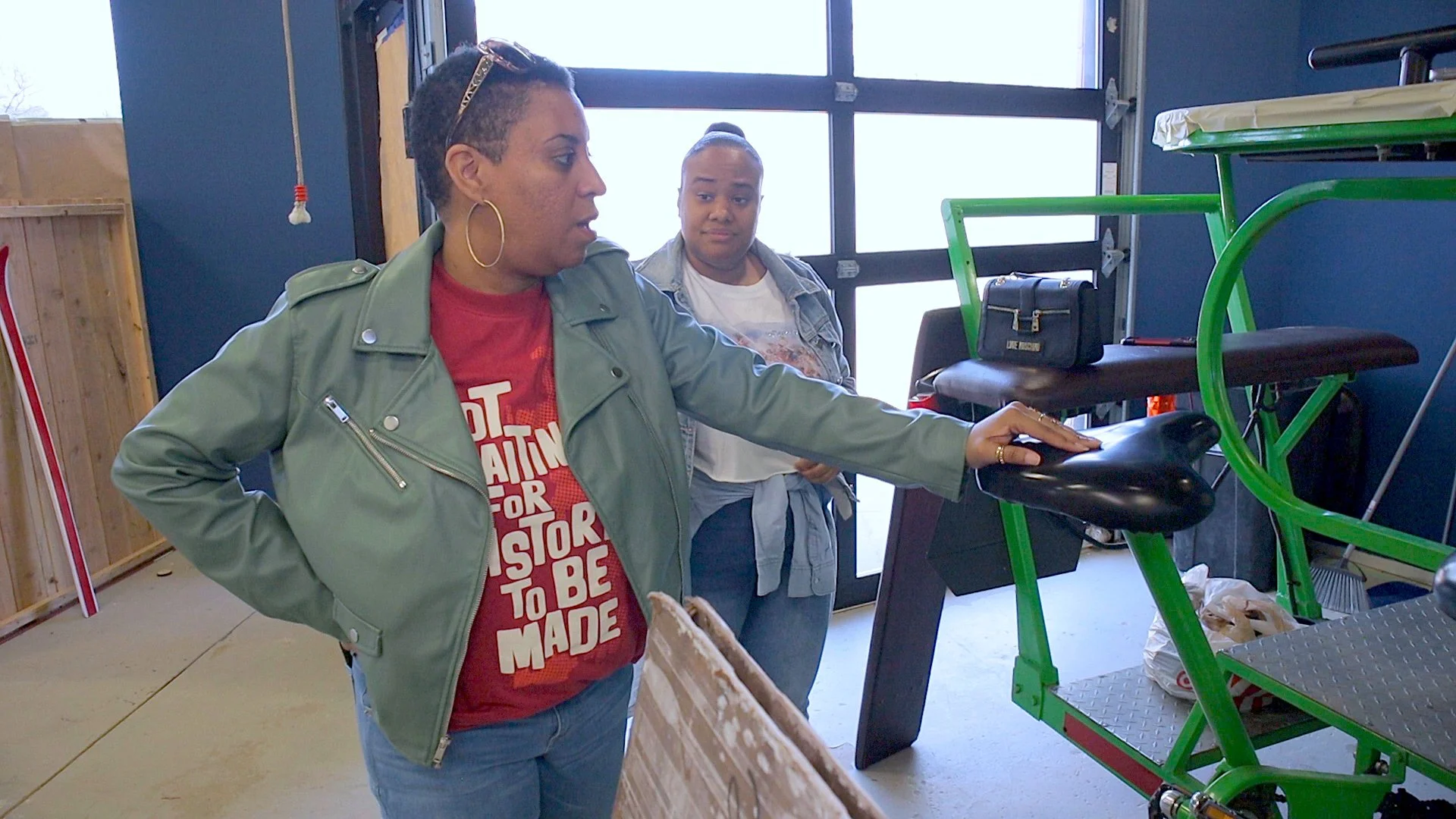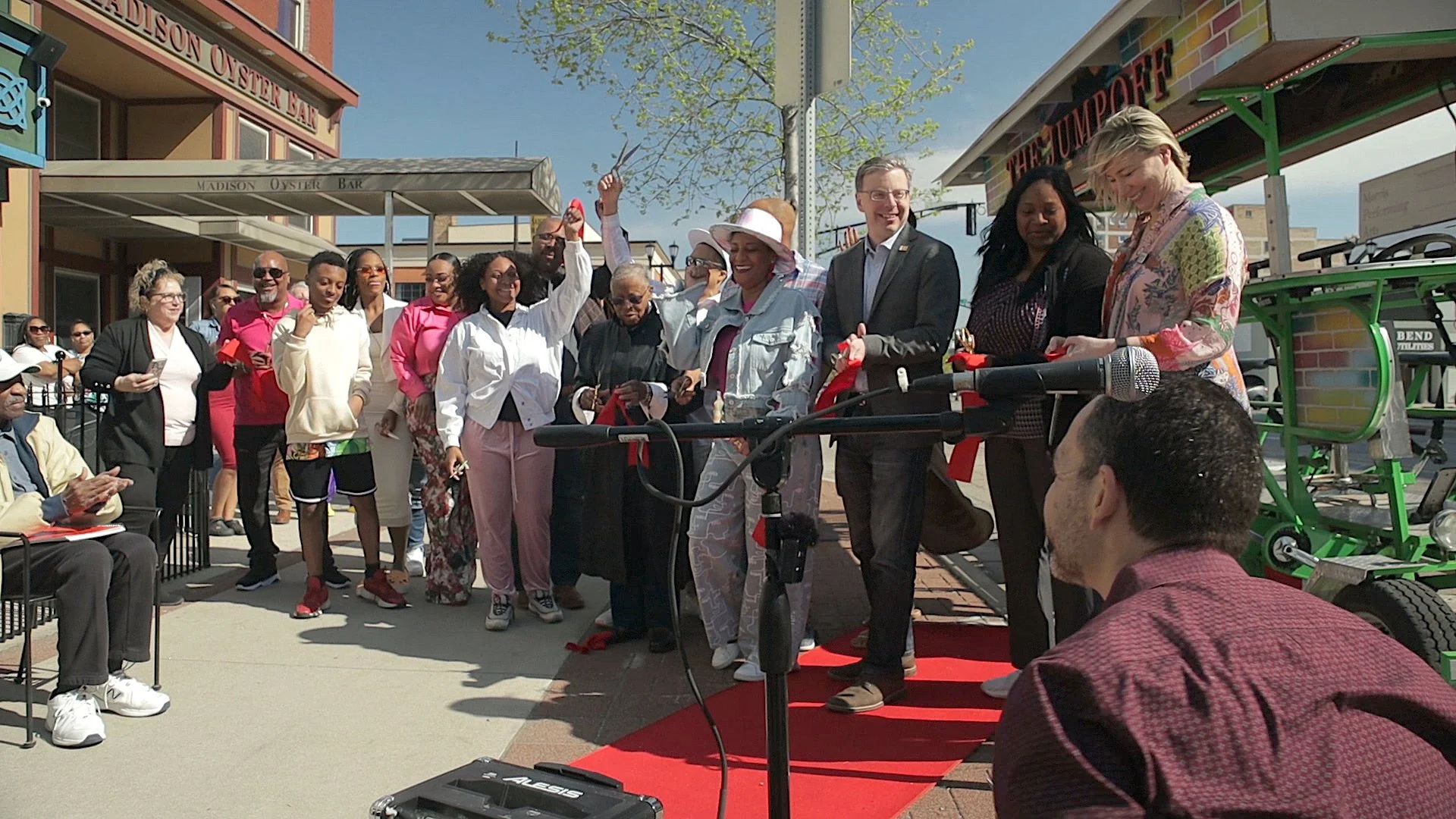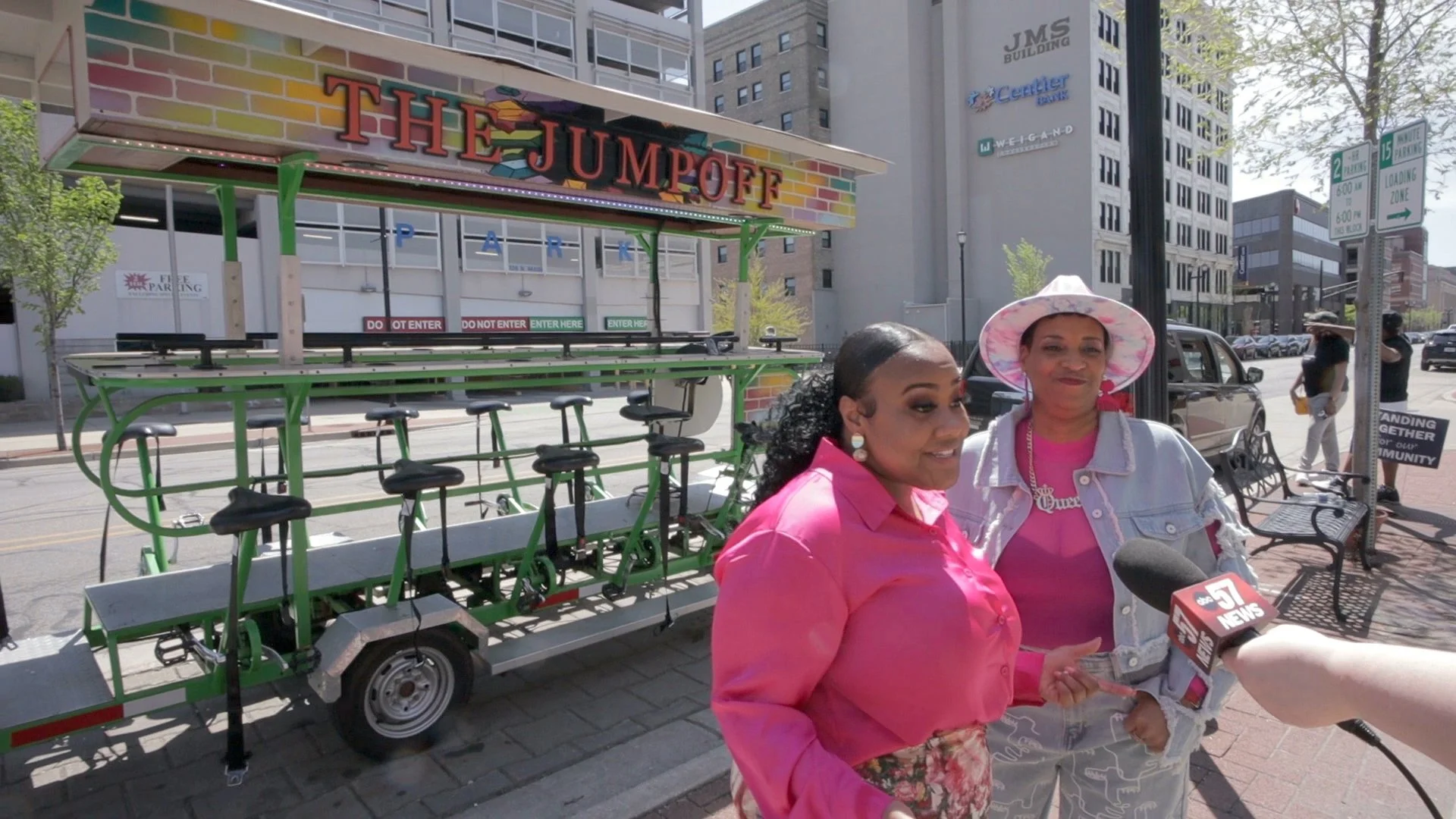CFSB celebrates pedal trolley startup
South Bend’s new entertainment attraction turns heads everywhere it goes.
The Jumpoff is South Bend’s first pedal trolley. Since its debut in May, the bright green foot-powered vehicle has been an eye catcher in parades, at art fairs, and on the streets of downtown.
“People will always stop – if they’re in their cars, if they’re walking, whatever. They’re just super excited,” says Rhonda Douglas, co-owner of The Jumpoff, describing how people will point and cheer as the trolley rolls by. “That never gets old for me,” Douglas adds.
Groups of six to fourteen riders can reserve the trolley for two-hour tours through the downtown area, making up to three thirty-minute stops at the local restaurants or bars of their choice.
The Jumpoff has hosted everything from birthday celebrations and corporate team-building outings, to groups of friends who “just want to experience South Bend in a new, fun way,” Douglas says.
The Idea
The new venture is a collaboration between Douglas and longtime friend Tiarra Hammond, who have been exploring business ideas for some time.
When Douglas saw a pedal trolley featured on a reality TV show, she called Hammond to see what she thought of bringing the trolley experience to South Bend. “I thought it was a super dope idea,” Hammond says. “It looks like a ball of fun.”
So the duo got to work developing their business plan. They leaned on the experiences of helpful entrepreneurs from other cities, and did their homework using popular research tools. “I think Google University and YouTube University are the terms everyone uses,” Douglas jokes.
Then things got serious. “Once we actually found a trolley, then it was a matter of how do we pay for it?”
An Uphill Climb
For entrepreneurs, the most common path to financing is through a traditional bank, which is where Douglas and Hammond started. “We had many meetings with local banks,” Hammond recounts, “and we had some hard ‘no’s.”
Because traditional lenders generally require loans to be secured, the duo faced tough choices. Douglas and her husband had purchased a home, and lenders wanted their home to be put up as collateral. “We were not willing to bet the house,” Douglas says.
“So then it was back to the drawing board,” Hammond adds.
That’s when they contacted CDFI Friendly South Bend.
“Our job is to connect people to financing,” says Sam Centellas, executive director of CDFI Friendly South Bend, who met with Douglas and Hammond to explore alternatives. “When we do that initial meeting,” he explains, “part of it is gauging whether they need a referral to technical assistance, or are they capital-ready,” and primed to be connected to a CDFI?
How CDFIs are Different
Generally, a Community Development Financial Institution – CDFI for short – is a nonprofit loan fund with a mission to provide development assistance to communities underserved by other lenders. “They’ll look at a business not like a traditional bank would,” Centellas explains. “They try to look at some different criteria, and try to be a little bit more flexible.”
Because Douglas and Hammond had already developed a business plan and other materials for their pitches to local banks, they were well prepared for their consultation. “They showed up with everything,” Centellas notes, “so we connected The Jumpoff with Allies for Community Business,” a Chicago-based CDFI.
“Allies for Community Business provides capital, coaching, and connections to entrepreneurs in South Bend and throughout Indiana and Illinois,” says Amanda Askew, Senior Community Lender at A4CB.
A4CB jumped on the opportunity. “We are honored to be a part of The Jumpoff’s business growth story by providing them the capital they needed to help purchase their trolley,” Askew says.
Douglas recalls the outcome a bit more excitedly. “We got the money! Finally somebody said yes!”
Building the Business
Once the duo bought the trolley from an operator in another city, the real work began – making it their own. With the help of local artist Angel Horn and maker Joseph Northern, the team added new paint, lights, a sound system, and a visual design theme that reflected their entrepreneurial spirit.
“Rhonda came up with this great idea of implementing a brick-by-brick pattern,” says Hammond, describing the trolley’s colorful design feature. “That spoke volumes to our journey,” adds Douglas. “We have built this thing literally brick by brick and now it's time to jump this thing off.”
Since the ribbon-cutting ceremony in May (where inaugural riders included South Bend Mayor James Mueller, city council members, and other notable locals), The Jumpoff has brought miles of fun to riders and onlookers alike.
But Douglas and Hammond want other entrepreneurs to know that running a business is about more than the fun and smiles people see on social media.
“That’s the glitz and the glory,” Douglas says. “But behind the scenes is the grind, and the struggle, and the tears, and the frustration, and the unknowns.” Among those unknowns were questions of alcohol consumption, insurance, and other administrative hurdles to be cleared with local government officials — who had to develop a permitting framework quickly.
Douglas feels she and Hammond are in a brighter spotlight than other entrepreneurs. “We know our integrity is on the line, no matter what,” Douglas says. “Just being black women, period. We have to show up and show out no matter where we are.”
That’s why Douglas and Hammond are not only grateful for the connection to A4CB, they would like to see more connections like it made in this community.
“Entrepreneurs – especially minority entrepreneurs – we don’t have assets. We have debt, but we don’t have assets,” Douglas explains. “So we have to talk about it. We have to not make it a secret, because everybody needs help. And that's another big takeaway is that they're willing to help us and meet you where you are.”
“People are super proud of us that we stuck in the journey and we kept going, even through the ‘no’s,” she adds. “The support has been overwhelming and much appreciated. So thank you, community!”
===
For more information about The Jumpoff, visit thejumpoff.net, or follow them on Facebook or Instagram.
If you are (or know) a local entrepreneur who needs capital or has an idea to be developed, contact CDFI Friendly South Bend to see how we might help.

